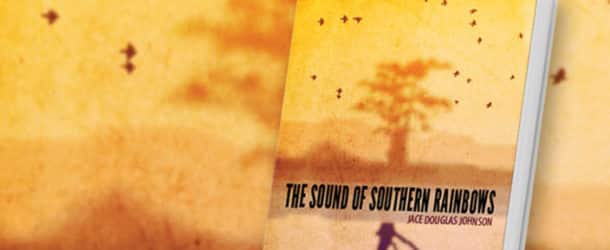The Sound Of Southern Rainbows By Jace Douglas Johnson
(Charolais Films, 2017, 449 pages, $18.99)
Book Review By Brad Goins
In this lavish tale of small town Southwest Louisiana life, Lacassine detective Kip Montet is working hard to drink away his grief over the murder of his young daughter by a serial killer. He works even harder to find that killer when his boss, Sheriff Jennings, tells him to back away from the case.
The Sound of Southern Rainbows is one of those murder mysteries that has at least some element of the supernatural in it. For instance, Kip’s best clues come to him in dreams in which the spirit of his departed daughter talks to him.
Kip’s nickname for his daughter was “Southern Rainbow.” In the book, Kip fondly recalls a day when his young daughter Riley Jane spoke at length about a rainbow she and her father were looking at. Riley Jane told Kip the rainbow was making sounds and asked him to listen to it. Greatly impressed by his daughter’s imagination, Kip dubbed her his “little Southern rainbow.” Hence the significance of the book’s title: Kip must listen to the words of his daughter’s spirit if he is to solve the case.
In his dreams, Kip also sees visions of a decrepit barn deep in the woods that the serial killer has made his base of operations. His search for the barn he’s visualized many times goes on through the entirety of the book.
When our story begins, it’s been two years since Riley Jane was murdered at the age of 7 by the serial killer. Kip’s treasured and revered wife Emma Mae Benoit, who is convinced her daughter was chosen by the killer because Kip was the lead detective on the case, leaves him after the murder. Kip often ponders the turn of events. “How quickly she had abandoned him was eye-opening, if not sobering” — a reference to Kip’s chronic drinking. Since the day his wife left, the reader is told, Kip has worn his cowboy hat tip down.
At the beginning of the book, the killer’s victims are three pre-pubescent girls and a very old hunter named Jacob Frugé. (Frugé is killed, one presumes, not because he was chosen but because he got too close to the killer’s base deep in the woods.)
This serial killer follows particularly elaborate rituals. He removes his victims’ intestines and replaces them with crow feathers. He burns Psalm 91:4 — “He shall cover thee with his feathers, and under his wings shalt thou trust: his truth shall be thy shield and buckler.”— into each victim’s flesh. On some wooden surface near the corpse, he etches an Egyptian black cat with a black compound whose chemical make-up defies analysis. He also leaves peacock feathers on the scene.
Cast Of Characters
Kip’s investigative partner is Det. Beasley Fontenot, a Creole whose “childlike optimism” is a “constant delight” to the world-weary Kip. Because of his autistic inclinations, Kip calls Beasley the “Rain Man of tracking people.” The reader is told that “if there was a speck of dirt on a speck of dirt, Beasley noticed the difference.” Early on, when he inspects a murder victim’s camouflage, Benoit concludes, “that’s a woods camo-print, not a rice field camo-print.”
Kip is also assisted by Jack Duhon, “a nerdy chemist that was built like a Cajun freight train.” Jack is the “God-fearing, magnanimous, pleasant” forensic scientist in the sheriff’s department.
The “slightly reserved” James Benoit is Kip’s best friend. The two men routinely swap jokes in which they question each other’s sexuality. In the rural “boudin hut” where the characters tend to run into each other, Kip asks James, “How’s your gender identity coming along? Any leads?” At one point, James says, “I always enjoy your self-defecating humor,” to which Kip replies, “It’s messy, but it’s good fun.”
Then there’s the important character Quenton LaBove, who rides around on a bike he calls Thunder; an alligator skull is attached to the front fender. Quenton, in his late 30s, is a “new-age hipster redneck.” Kip feels that Quenton, who undoubtedly has a fair degree of retardation, is gifted with “a soul that was inexhaustibly gentle and kind.” He feels about him as if he were a son.
Quenton’s antics and tall tales are something to read about. He brags about his “puma-warrior ninja skills.” At one point, Quenton tells Kip he’s trained the three-legged cat who hangs out at the boudin hut to be a ninja. “He’s won over a thousand underground cat fights. Now, just imagine if he had his legs.” Kip wonders, “How is [Quenton] still alive at nearly 40?”
Just as eccentric as Quenton is “that ole hippie” Doc Hebert, a retired professor of geology who’s taken too much acid. On his many walks about town, he wears a linen robe. He never hesitates to rant to himself in public.
On the porch of Autry’s Feed & Grain, three octogenarians spend their days in rocking chairs. In his daily rounds, Kip greets them with the inquiry “You youngens doing all right?”
The old men’s nemesis is Disco Princess. Once the high school’s star quarterback, he is now the “muscle-bound, chisel-jawed resident transgender.” When Disco Princess puts her boom box down on the street and breaks into her provocative dance number, the old coots on the porch threaten to blast her with a shotgun.
The Mystery Unfolds
As he pursues his investigation, Kip hears a rumor going around town that Disco Princess was seen sitting in the passenger seat of state Sen. Landry’s car. A while later, when Kip questions the disco diva, he notices a cuff link of Sen. Landry in the midst of the meth smoking debris.
Kip’s efforts to eliminate the senator as a suspect lead to several plot twists and some significant violence. Kip also feels the need to clear Doc Hebert (who is probably suspected more for his oddity than for anything he’s done).
In the course of these fruitless investigations, Kip gets scant encouragement from Sheriff Clyde Jennings. Kip dislikes the sheriff because he is, among other things, “a stickler for rules.” Kip’s dislike for Jennings is so intense that each time he’s called into the sheriff’s office, he destroys a couple of Jennings’ possessions. But this doesn’t dissuade Jennings from grousing to Kip “five years, four murders, zero leads.”
The truth is, there are several good leads. The problem is, they all come from Kip’s dreams. The fact that Kip is indeed seeing visions of the murderer’s center of operations in his dreams ensures that the book has at least some element of the supernatural in it. There will be other strong indications of the supernatural when the murderer is finally caught and dealt with.
When the sheriff puts two FBI agents on the case, Kip shows his disdain for them by asking one, “What gender pronoun do you prefer to be called by?”
Kip “knew there was only one reason the sheriff would decline to inform him of the FBI’s impending arrival: Kip was now the main suspect” in his daughter’s murder. The FBI’s investigation of Kip is just one more of the many twists the mystery will take before it’s all wrapped up in the final paragraphs of the book.
After the sheriff enables the agents to get a warrant to search Kip’s house and truck, he tells the enraged detective, “you’re having a mental breakdown.”
But Kip is neither too broken nor drunken to keep pursuing his daughter’s killer. He consults with Benoit’s father, who is thought to be the last Atakapa traiteur (or healer). The traiteur correctly intuits that Kip is Coushatta (and hence able to envision things in his dreams). At one point, he grabs Kip by the face, looks him in the eyes, and says, “Your lil girl was here. She say, she need you tah be strong, and she say, she need you tah find a way tah hear duh rainbow.” Kip is told his dead daughter has been trapped by the spirit A Nah-Ak-Tewe; it, in turn, can be trapped with crow feathers, just like the ones that have been stuffed into all the victims’ bodies.
Kip goes to another spiritual leader to explore a peculiarity of the serial killer: the latter leaves writings in the ancient language of Aramaic at the murder scenes. Kip turns to the local priest Father DesOrmeaux, who tells the detective the writings refer to the demon Adramelech, who “preys on the souls of children.” The Father relates stories of sacrifices of children to Adramelech that appear in the second book of Kings.
A devastating moment in the story occurs when Kip finds Quenton in the woods — crucified, his stomach stuffed with crow feathers and Psalm 91:4 carved into his skin. As Kip keeps uncovering creepy woodland locations that are marked with the killer’s symbols, readers can experience eerie True Detective-style moments.
Kip The Anti-Hero
Kip is undeniably the protagonist of this book, and the unfolding of his character is in itself more than sufficient reason to read the entire volume. The reader is given insights into Kip’s hard-boiled nature at regular intervals: insights such as this — “Kip, like most people, had an inherent ability to see straight into the purity or impurity of someone’s soul — the problem was accepting what he found.”
Kip has long since discarded “the wanton waste that is self-pity.” He “never cried when he was a kid. He never understood why other kids did. That was a learned trait that made no sense to him. How in the world is crying about pain going to accomplish anything? Kip had learned far too early that physical pain is not real pain, and he had learned that lesson the hard way. Real pain was watching your strong and beautiful mother as she rapidly grew bald, and thin, and weak.”
Kip is a 21st century version of the mid-20th century “anti-hero” (as he existed in the lives and works of such figures as Norman Mailer, Robert Lowell, Jackson Pollock and James Dean, and the protagonists of some film noirs). Like these characters, he’s had a crystal clear awareness of hard life experiences and the routine shortcomings of the human creature. As a result, he’s developed his own strict ethical code (which has little in common with conventional ethics) and has sought relief in the bottle.
Kip feels that his wife’s “pride for him had died with Riley Jane, and Kip’s self-identity died with it.”
The narrator tells the reader that for Kip, “understanding why no longer seemed important. Being smart appeared to do more for worry than happiness. So, he stopped questioning and followed his instincts for a change.”
Such lines make it clear that if Kip wasn’t an anti-hero before his wife’s departure, he is certainly one now; and he’s one who spends little time concerning himself with thoughts of happiness.
He sees his wife Emma May, in contrast, as “not a strong woman … Her fight or flight response was stuck on flight or flight.” In his misguided efforts to regain his wife’s affection, he remembers his late mother’s warning that women don’t like to be chased (but chooses to ignore it).
In one heart-rending scene, Kip’s estranged wife invites him over to her place — only to hand him divorce papers. Her words to him are at least direct: “Every time I see you, I’m disgusted … I don’t want to be, I just am.” As Kip tries to process the turn of events, he thinks, “How could anything so beautiful be so lonely and cruel?”
Local Flavor
In addition to providing a riveting mystery, The Sound of Southern Rainbows offers the most colorful and precise descriptions of rural coastal Louisiana life you’re likely to see in print. Especially strong in this respect are the many scenes in which the main characters stop off at Nou-Nou’s Bait & Boudin Shack for their daily boudin, cigarettes, dip and liquor.
The vivid local flavor is easily demonstrated by means of a few quotations from the book:
— “The men of Jefferson Davis Parish, Louisiana, did not attend counseling, aromatherapy or reiki sessions: they either attended Bible study or imbibed, and that was just the way things were.”
— “Lines of snow geese and red-winged blackbirds poured from the clouds onto islands of maiden cane, black willows and water tupelos.”
— “Kip was particularly partial to a quaint little fishing camp his paw-paw Douglas had nicknamed Valhalla. The beloved escape was nestled upon a shell chenier sprinkled with old gnarled oaks that whispered ancient secrets through their dripping beards of Spanish moss.”
Part of the book’s local color comes from the many country sayings sprinkled throughout the text. Here’s a sampling:
— “harder than woodpecker lips”
— “as slow as a box turtle on a block of ice”
— “as mean as a chicken-fed chicken”
— “whiter than the north side of an egret’s poo”
— “thick as stolen milkshakes”
— “a country mile on the back of a two-legged hound dog.”
I don’t know whether Johnson made any of these up. But for this reader, they’re perfect parallels for the country sayings he heard growing up in southeast Tennessee.
An Exciting Whodunit And A Fascinating Bad Boy
So, in summary, there are a number of good reasons to read The Sound of Southern Rainbows. First, it provides an exciting whodunit that’s just complicated enough to be intriguing. (For once, I managed to figure out who the culprit was before I got to the end. I mentioned this to Johnson, and he said he wanted to give readers an opportunity to exercise their own investigative abilities. Good idea.)
Second, if you want to read about a character who thinks like a French existentialist; has the tough, don’t-give-a-damn swagger of a Robert Mitchum character; and jokes like Dane Cook, you’ll want to follow the character development of Johnson’s detective Kip.
Finally, you can get a vivid and crystal clear picture of how life is lived and conversation is conducted in the Louisiana parishes near the Gulf coast. Whether you’re a native, a transplant or a newcomer, you will be pleased.
Notes On The Author, Jace Johnson
Jace Douglas Johnson is a native of Lake Charles, and a graduate of St. Louis Catholic High School.
His bucolic writing style, inspired by his love for Louisiana, has drawn comparisons to the works of William Faulkner and Harper Lee.
Johnson’s imagination is inspired by a childhood of hand-lining blue crabs in the marsh canals, tossing beetle spins for chinquapin in the bayous, hunting mallards in the marais and dangling from ancient live oaks on antediluvian cheniers.
His love for soccer led him to success at the collegiate level in California, where he graduated from Claremont McKenna College. He remained in the Los Angeles area, immersing himself in the world of writing and filmmaking for 20 years.
He is best known for co-writing and producing the film Little Chenier: A Cajun Story, which was based on his novel Little Chenier, Les Jours De Pemon.
He currently resides in New Orleans.
Writing about Kip Montet, the protagonist of his new novel The Sound of Southern Rainbows, Johnson states, “his paternal martyrdom is sealed as he places the salvation of his daughter’s soul above his own — the path to her killer leading to un-heavenly gods.”
He feels that his recent work “can be most accurately described as Southern Gothic.”


















Comments are closed.